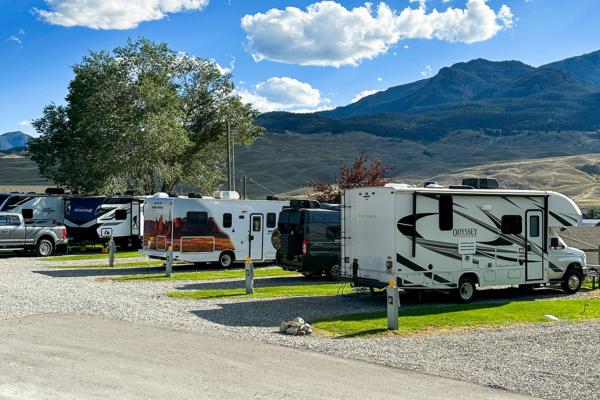
Looking to buy an RV but not sure where to start? Try easing yourself into the RV lifestyle by renting an RV first.
Rental RVs let you experience what RVing is like without a big financial commitment, which is smart. And because you’re not financially tied to an RV, you can try out several makes and models until you find the rig that truly fits your RV lifestyle.
Let’s get started.
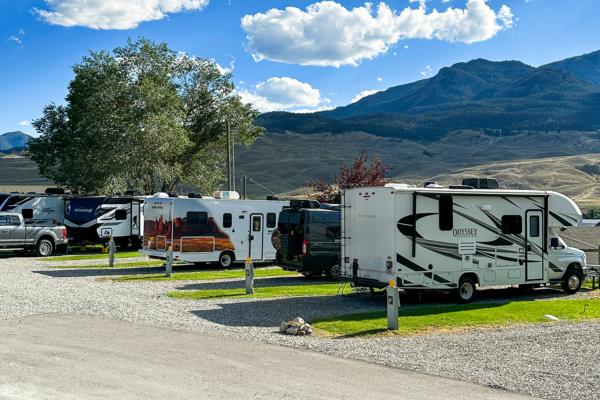
Why Renting an RV Saves You Money
We know it sounds counterintuitive, but spending money renting an RV will save you money in the long run. By renting, you can avoid the costly mistake of buying the wrong RV. RVs lose value quickly, and buying and trading can lead to significant financial losses.
Did you know in the first year alone, RVs can depreciate by 10% to 20%?
Buying and trading your RV can quickly add up. Here are some stats from the recent RV Owner Demographic Profile Study:
- 20% of current RV owners trade or sell within the first two years of purchase.
- 25% of RV owners keep their RVs for three to five years before trading or selling.
- 40% of current RV owners are already on their third RV.
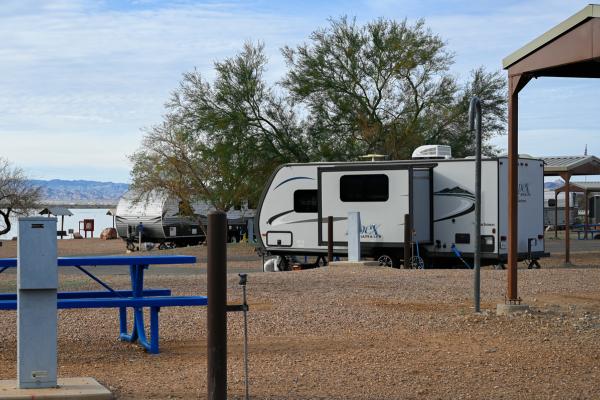
Renting Helps You Choose the Right RV
Renting gives you a taste of what it’s like to drive, park, and set up an RV without making a long-term commitment to the RV lifestyle you thought you wanted. Here are some reasons why renting an RV is a good idea.
Experiment with Different RV Types and Sizes
If you’re an inexperienced RVer, you might choose a rig based on what looks appealing rather than buying the RV that actually meets your camping needs. The more time you put into learning about the RV lifestyle, the more prepared you’ll feel when it’s time to buy an RV. That’s why renting different RVs will help you narrow your search and find out which make and model fits your RV lifestyle the best.
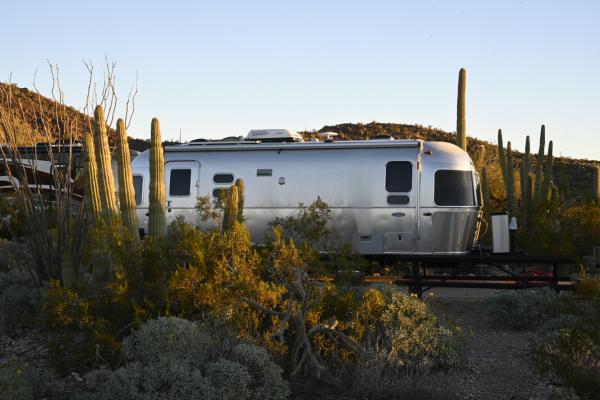
Understand Storage and Space Needs
Spending just a few nights in an RV helps you understand how much living and storage space you really need. What seems roomy during a quick tour might feel cramped after you’ve unpacked and stayed in a compact motorhome or trailer for a few days.
You don’t have to be a minimalist to own an RV. Taking only the essentials while traveling in an RV works for some people, but others may argue the opposite. Some people have an RV because they can take along the things they want and need when they’re on the road.
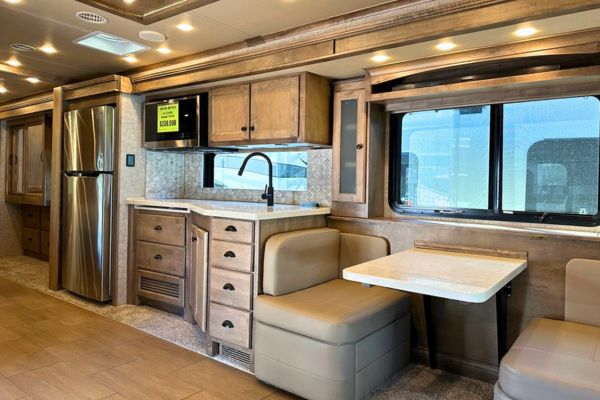
Discover What You Really Want in an RV
It’s one thing to look at floor plans and amenities online or in a showroom, but it’s another to cook meals in the kitchen, put your kids to sleep in a hide-a-bed, or shower in a wet bath. Renting an RV lets you figure out if you will actually use the outdoor kitchen and electric fireplace or if you need a living space with dual slides.
“When looking to buy my first campervan, I fell in love with the rear-bath models. I was convinced a rear bath was the best Class B floor plan on the market. I was wrong. Once I bought the van, I quickly realized it was impossible to open the back doors to get a cross breeze when I stayed in a campground or other public area. No one wants to see someone’s toilet on display front and center!” — Meagan Butler
Choosing Between Towable and Drivable RVs
What’s better? A towable or drivable RV? It depends on what type of RVing you plan to do. You might think that a Class A motorhome is the perfect RV until you realize the places you like to visit have limited oversized parking, and your preferred camping style is more suitable for small campgrounds instead of luxury RV resorts.
If you’re thinking of going full-time, renting gives you a chance to see if the lifestyle aligns with your expectations, which is especially important if you want to RV full-time.
RV Rental Companies
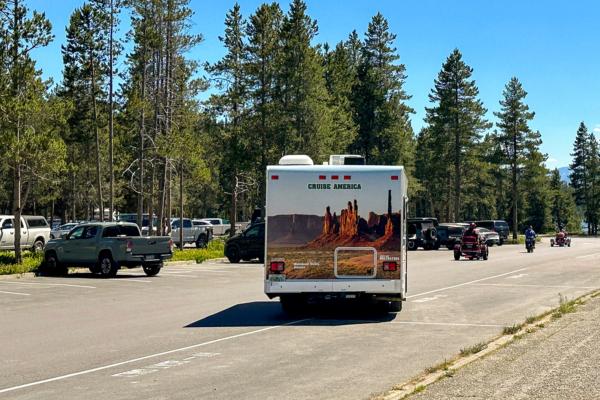
Standard RV Rental Companies
Companies like Cruise America, El Monte RV, Indie Campers, and CanaDream have a range of RVs for rent, with locations in major cities across North America and beyond. Their easily recognizable fleets, mostly made up of sturdy Class C and Class B motorhomes sporting bold company logos and vibrant decals, are designed to handle the demands of frequent rentals, long-distance travel, and even one-way rentals.
Peer-to-Peer RV Rentals
Peer-to-peer (P2P) RV rental companies, like RVezy, Outdoorsy, and RVshare, connect prospective renters with private RV hosts. Similar to Airbnb, peer-to-peer RV rental platforms make it easy and safe for renters to search, pay, and book a rental RV.
RV Rental Tips for First-Time RVers
Book Your Campsite
Should you rent an RV and then book your campsite or vice versa? Either will work, but we recommend booking your campsite first and renting your RV. However, research and be familiar with the RV type you hope to rent to ensure you choose a site that will accommodate the length, width, and kind of RV you rent.
Find out why joining FMCA as a Pathfinder member will help you learn everything you need to know about RVing — and more — all from a welcoming community of experienced RVers.
Choose Full Hookups
Booking a campsite with full hookups is a must for any RV newbie. Full –hookup campsites have water, electricity, and sewer connections at the campsite, which means you won’t have to worry about conserving water or power, and you can empty your tanks without driving to a dump station. Since you’ll have your utilities at your site, you can learn how hookups work in a low-stress environment.
Ask for a Delivered RV
Renting an RV and having it delivered is one of the easiest ways to try out the RV lifestyle without worrying about driving, towing, parking, or setting up. It’s especially helpful if you want to try out an RV but don’t have a car or truck equipped to tow. Since most fleet RV rental companies don’t offer delivery and setup, you’ll need to book your rental from a peer-to-peer RV rental platform to have an RV delivered.
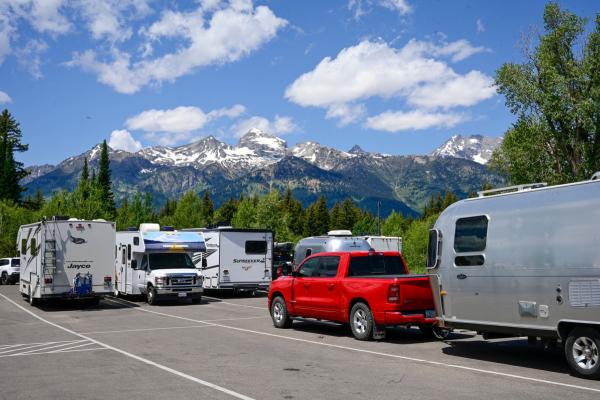
Look for Hidden Fees and Extra Charges
Check which amenities or extras are included in the price of your RV rental and which ones are not. Common rental fees may include a security deposit, RV rental insurance, roadside assistance, mileage, generator usage, service fees, add-ons, taxes, and more. Some rental companies include kitchen essentials, linens, bedding, cleaning supplies, and camping gear in their nightly rate, while others may charge extra if you want to add items like silverware and plates, grills, bikes, and more.
Read the Reviews
Reading reviews helps you get a feel for the RV’s condition, so there are no surprises when you pick it up. You’ll also find out if the owner is responsive and easy to work with—a big plus if questions come up on the road. Reviews can tell you if the RV is comfy and simple to use, making it easier to know if it fits your travel style. Plus, past renters often share their experience with the RV, so you’ll know if it’s the right choice for you.
Final Thoughts
Starting your RV journey with a rental lets you try the RV lifestyle without a long-term commitment. You never know; by renting an RV, you might find that your preferred RV is totally different from what you expected!
 Meagan Butler is an experienced RV owner who works and plays in the RV space. She’s a moderator in the RV Curious Facebook Group and loves helping people learn about the ins and outs of the RV lifestyle. When she’s not writing and editing RV-related content for industry organizations, she’s adventuring with her Cavalier King Charles Spaniels or refining her photography skills. Meagan has been a member of FMCA since 2018. Meagan Butler is an experienced RV owner who works and plays in the RV space. She’s a moderator in the RV Curious Facebook Group and loves helping people learn about the ins and outs of the RV lifestyle. When she’s not writing and editing RV-related content for industry organizations, she’s adventuring with her Cavalier King Charles Spaniels or refining her photography skills. Meagan has been a member of FMCA since 2018. |


Leave a Reply